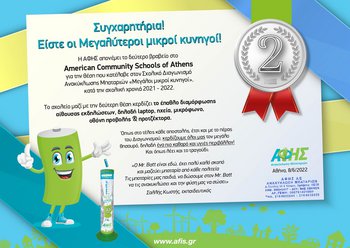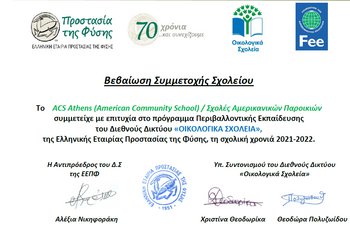The Youth-to-Youth (Y2Y) educational and social integration program is a long-term school project designed to support unaccompanied refugee minors. ACS student volunteers serve as teaching assistants providing one-on-one teaching to unaccompanied refugee minors. This program was also offered online during the lockdown with the ACS Athens students’ continued assistance working with the Y2Y students in breakout sessions, continuing both learning and social interaction with these young individuals living away from their families.
Since the 2021 - 2022 academic year, ACS Athens has undertaken various recycling initiatives as part of a rigorous recycling program, which has been designed in order to serve the vision of ACS Athens. The ACS Athens Recycling Program's vision is to inspire the school community to embrace the values of environmental education, take action to promote recycling and contribute towards the creation of a sustainable campus environment. The ACS Athens Recycling Program aims to implement a schoolwide recycling mechanism on campus - in and outside of the classrooms - in order to educate and engage students and the school community in recycling through learning, action, and partnerships.
Recycling Initiatives
1. ACS Athens participation in the Panhellenic recycling batteries tournament
ACS Athens has proudly participated in the 1st and 2nd Panhellenic recycling batteries tournaments, which have been organized by AFIS, Earth Organization, and No Waste21. ACS students were engaged in the famous “battery hunting” and collected the impressive number of 127 kg of empty batteries, which were delivered to AFIS, achieving 2nd place among all participants (2021 - 2022). ACS Athens campus has been equipped with bins in each school building (elementary, middle school, high school, learning commons) suitable for battery recycling. Through this initiative, ACS students' mindset is being cultivated gradually towards sustainability and effective waste management. It needs to be highlighted that the data provided is transparent through the AFIS website.
2. ACS Athens participation in the Eco-Schools program
From 2021 - 2022 ACS Athens middle school students - members of ACS environmental clubs and recycling teams, address the waste management issue through participation in the Eco-Schools program, an international educational program offered to ACS through the Hellenic Society for the Protection of Nature (HSPN). Through participation in this program and proper guidance from their advisers, ACS students have accomplished to implement interventions to address the waste management issue on campus through conducting observations related to the materials their classmates waste and deciding upon an effective recycling system, which is followed by a weekly recycling service duty. During the 2022 - 2023 academic year, the Middle School recycling team focused their efforts on raising awareness within the ACS community to recycle paper - in the classrooms - and plastic water bottles on campus, collected the recyclable materials weekly, created an eco code of conduct, and participated in an ACS podcast to share their story. ACS's goal is to implement thoroughly all the steps required from the Eco-Schools program to be awarded its Green Flag.
3. The Green City Program
ACS Athens has also extended its positive recycling impact through its registration at the Green City Program. The Green City Program is a reward recycling program functioning in the municipality of Athens, one of the largest in Europe. In numbers, according to its website, 66 municipalities are part of the program, with more than 4.000.000 citizens having been registered. During 2022 - 2023, ACS Athens was delivering the recyclable materials which were collected by students, faculty, and staff in the “Green Trucks,” completed an incredible 115 transactions in 13 municipalities, recycling approximately 2 tons of paper, plastic, and glass so far. It needs to be highlighted that the delivery is only allowed by material, therefore, as part of this program, students, faculty, and staff are continuously challenged to manage their waste in an effective and conscious way that leads to collection by recyclable material and ultimately ensuring an efficient recycling process.
144
Transfers
15
Municipalities
2453.19 kg
Total amount of recyclable materials
More information on ACS Athens Recycling Program and initiatives:
The ΚΟΙΝΩΝΟΣ (KINONÓS) club members determined to interact with the homeless people in Athens organize weekly visits to specific areas. Their goal is to understand the state of affairs of such individuals and how they arrived at their predicament so as to provide appropriate assistance from offering food and clothing to having conversations that allow these people to be seen and heard.
There is a strong tradition at the ACS Athens Middle School to celebrate United Nations Day as a commemorative event on October 24th. This day leads to the development of a lasting service-learning experience for middle school students using on the United Nations Sustainable Development Goals (UN SDGs or Global Goals) as a guide and building on the ACS Athens belief that education is to challenge students to grow not only academically but “socially and ethically” so that they “thrive as responsible global citizens”.
Through their advisory classes, students prepare for UN Day by exploring the 17 SDGs as a whole. On the whole day event on October 24th, students share their previous volunteering experiences with their classmates in order to trigger inspirational momentum to kickstart the day and the educational experiences which will ensue. Following the presentations, students are challenged to explore a UN SDG in depth and then begin the development of personal commitments and/or action plans within their community or wider community within their advisory classes.Sixth grade students focus on the goals for the protection of the planet, seventh grade students focus on the goals around poverty, and eighth grade students focus on the goals that relate to inequality and injustice. Thus, through this continuum, all major themes are explored by students throughout their middle school years while continuously gaining a holistic perspective of local and global needs which could help them think critically about solutions on a local and wider scale level. The aim of this work is to enable and sustain students to become architects of their own service.
The Moodle platform provides the resources, student-to-student and student-to-teacher communication that facilitates and guides the process.
Students work all year on weekly personal goals and reflect daily on their goals. Students are then introduced to the Sustainable Development Goals as goals for the world. Students are invited to participate in working together with others to help the world reach its goals. Last year second graders took on Goal 4: Quality Education and wrote books for children who lack access to books. After class discussions of additional SDGs students created projects such as a gender equality club and plans for a 17-station playground in which each station teaches children about an SDG. Second grade action included a beach clean up in support of Goal 14: Life Below Water.
Though the year-long integrated science and social studies students learn, among many things, about natural disasters, ecosystems and adaptations. One of the culminating projects is to build a sustainable city where humans and nature can co-exist and thrive peacefully. These projects incorporate Goal 7: Affordable and Clean Energy, Goal 11: Sustainable Cities and Communities, Goal 13: Climate Action, and Goal 15: Life on Land. Third grade action included a fundraising campaign to support the Amazon rainforest.
Through the fourth grade reading unit on informational text students were invited to become gatekeepers to help them make connections between the SDGs and their daily lives within their communities. Students were asked to commit to working on one SDG for the year. Through the science unit on energy, students are working on building mechanisms that use sustainable sources of energy to operate. Projects include pneumatic machines such as a grabbing hand, lift and crane; machines using robotics such as a dam and an electric car; and solar powered machines such as a crane, fan and lights.
Fifth graders learn about all SDGs through a variety of print and video sources through their Argument and Advocacy reading unit and then focus on convincing others to act in favor of the earth through the Research-Based Argument Essay writing unit. Students develop their persuasive skills through essays and debates where they are learning that these issues are complex with many perspectives and incentives operating both for and against achieving the goals. Student action has included a family meeting to discuss and address food waste in the home, collecting essentials for refugees, and the creation of an environmental advocacy club.





